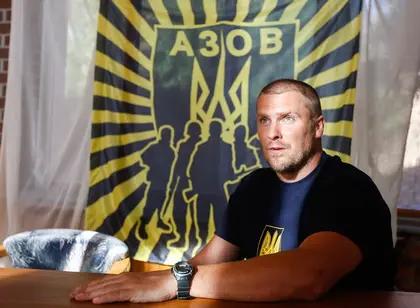Activists have been digging trenches while workers from the local metallurgical plant have been welding anti-tank obstacles. Meanwhile, fighters in the local volunteer Azov Battalion have been preparing for battle.
“We have the strength, skill and fighting spirit to resist Russia,” said Oleg Odnorozhenko, 39, the battalion’s deputy commander whose nom-de-guerre, “the doctor,” comes from his doctoral degree in history.
JOIN US ON TELEGRAM
Follow our coverage of the war on the @Kyivpost_official.
The battalion is primarily made up of far-right activists from eastern Ukraine, who have kept order in the city of 500,000 since pushing out Russian-backed separatists on June 18.
The battalion’s headquarters is located at the summer residence of former Ukrainian president Viktor Yanukovych’s elder son in Urzuf, a town near Mariupol.
The walls of the mansion have been painted with a traditional floral motif, and armed Ukrainian cossacks have been painted on the gates with a Ukrainian nationalist symbol between them.
On Aug. 31, the Kyiv Post was escorted in an armored vehicle to their training facility that also functions as a hospital.

Fighters were walking the grounds that had previously been an evergreen park on the Azov seashore before being repurposed as a military base.
There is a large brightly lit room with the black-and-yellow Azov battalion flag on the wall the Kyiv Post met with Vadim, 34, the battalion’s deputy commander who goes by the nom-de-guerre “the Trojan” and does not identify himself for security reasons. He said several lines of fortifications were currently being constructed around Mariupol.
Vadim, however, says they are desperate for the heavy arms they have been demanding from the government for months.
“Fighting with a Kalashnikov in this war is like (fighting) with a fly swatter. Accuracy, speed and caliber decide everything,” he said. “This is a war of artillery and tanks,” he added.
The Azov battalion includes some 400 fighters,and they say they pay more attention to military training than other pro-Ukrainian paramilitary groups. Here they receive 1-2 months of training rather than several weeks.
Many of the fighters are also members of the far-right Patriots of Ukraine and Ukrainian Social-Nationalist Assembly, and say they learned how to use guns at training sessions held in forests years ago.
“We realized the danger posed by Russia and understood that sooner or later we would have to fight,” Odnorozhenko said.
They first emerged as a small partisan pro-Ukrainian force in Donbas known as the “little black men” back in April, taking control of small towns and villages in the southern Donetsk Oblast.
The saw fierce fighting in Marianka and Ilovaisk and say dozens of their of their members were killed. For strategic reasons, however, they decline to name the exact number of fighters they have lost or the scope of their armaments.

They are happy, however, to share evidence they say proves they have been fighting regular Russian troops in recent days.
Vadim says they captured an armored vehicle from the Russian army as well as two Russian soldiers last week.
Though they say they are facing Russian soldiers, Azov fighters say they are against the Kremlin, not the Russian people.
“We are not enemies with Russians, these are all lies,” Vadim said, adding that it will be a bitter victory for whoever wins the war.
Russian troops managed to advance to the south over the week-end, taking the town of Komsomotske according to the Agence France-Presse.
Azov’s commander Andriy Biletsky said their next target will be Volnovakha, another town to the north of Mariupol, in an interview with the Inter television channel on Aug. 31.
“They (the Russians) will attack not from Novoazovsk but from the north, where the situation is more complicated. They want to split (Ukrainian) groups by attacking Volnovakha,” he said.
Now members of the Azov Battalion brace to fight back an assault on Mariupol, saying that the loss of this large and strategically important metallurgical city located on the coast of Azov Sea could lead to the loss of the entire Donbas.
Vadim, born in Kharkiv, who worked as a business crisis manager in Kyiv, said the loss of Mariupol would the same as “the loss of motherland” for him and he is ready to fight to the end for this city.
“Many people love their motherland, but few are willing to die for it,” he said.
Editor’s Note: This article is produced with support from www.mymedia.org.ua, funded by the Ministry of Foreign Affairs of Denmark and implemented by NIRAS and BBC Media Action, as well as Ukraine Media Project, managed by Internews and funded by the U.S.Agency for International Development. Kyiv Post+ is a special project covering Russia’s war against Ukraine and the aftermath of the Euromaidan Revolution. Content is solely the responsibility of the Kyiv Post.
You can also highlight the text and press Ctrl + Enter




